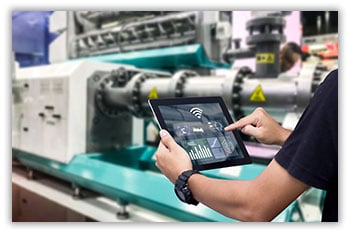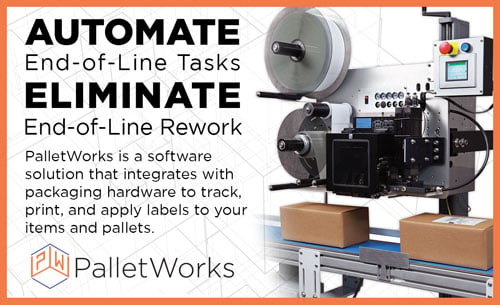- Home
- Services / Solutions
- Manufacturing Execution System (MES) Solutions
Optimize Production Efficiency and Visibility with Advanced MES Solutions
Unlock the full potential of your production line with state-of-the-art manufacturing execution system (MES) solutions from Cybertrol Engineering. As a leading control system integrator, we offer MES solutions that seamlessly bridge the gap between plant floor operations and business systems, ensuring real-time data visibility, optimized performance, and enhanced productivity.
With today’s myriad of challenges in manufacturing, from finding skilled labor to supply chain constraints, manufacturers must embrace smart manufacturing technologies to stay competitive. Adopting a manufacturing execution system (MES) is an important step in digital transformation, offering the fundamental value of gaining real-time visibility and control of operations to improve productivity and performance.
“Global MES solutions are a foundational building block of smart manufacturing strategies and digital business for manufacturers.”
– Gartner, 2021
At the highest level, an MES can help you use real-time data to make more informed decisions.
- Use advanced analytics to reduce downtime, waste, and defects
- Enhance interoperability of industrial IT/OT
- Harness predictive maintenance
- Optimize operations to lower costs and increase yields
An MES is a comprehensive software solution that plays a crucial role in modern manufacturing processes. It serves as a bridge between the shop floor and the management systems, enabling seamless coordination, control, and optimization of production operations. The MES provides real-time visibility into the entire manufacturing process, from raw material acquisition to finished product delivery. With its ability to capture, analyze, and exchange data, the MES empowers organizations to enhance productivity, improve product quality, reduce costs, and make informed decisions to meet customer demands effectively.
With accurate and timely data capture, MES enables companies to monitor and control manufacturing activities, ensuring adherence to schedules, minimizing downtime, and maximizing throughput. The integration of MES with various systems, such as enterprise resource planning (ERP) and supply chain management (SCM), facilitates data exchange and enables informed decision-making. The MES also enables effective inventory management, reducing waste and ensuring timely material availability. On top of that, MES supports quality control by monitoring and analyzing production data, enabling early detection of defects and facilitating prompt corrective actions.
Cybertrol's Evolution to Modern MES Solutions
Since its inception, Cybertrol Engineering has been integrating MES and control systems to provide recipe formulation management, track and trace, and inventory management for raw materials and batching. Cybertrol integrated these as custom-developed, standalone solutions before the advent of modern MES platforms such as Rockwell Automation’s modular Plex Smart Manufacturing Platform.
Cybertrol Engineering focuses on process control-heavy industries such as food and beverage, dairy and cheese, and life science, where batching is a critical requirement for an MES platform. Where batching is used, several other MES functions are also critical, such as formulation management, track and trace, inventory management, transactions, finished goods production, quality management, and warehouse management.
Beyond its ability to streamline production, MES platforms have revolutionized preventive maintenance by interfacing to computerized maintenance management systems (CMMS). Without a CMMS, maintenance is normally replacement or repair of wear items on a time-based schedule. A CMMS can interface with the control system to have a proactive maintenance schedule, replacing items only as needed.



Modular Functions of a Modern MES
Today’s MES platforms can offer a wide array of modular functionality, which can be tailored to each specific plant’s needs and expand with the business’ growth. Each of the capability groups below contains several discrete functions developed to gather data and output specific reports.
- Manufacturing automation
- Production management
- Quality management
- Inventory management
- Tool management
For example, in production management, you can track scrap, OEE (overall equipment effectiveness), yield, MRO (maintenance, repair, and operations) rejects, and more. In manufacturing automation, you have real-time visibility into KPI (key performance indicator) dashboards, alarms and notifications, and operator interface. Inventory management offers inventory traceability, product genealogy, serialized part management, cycle counts, shipment container tracking, lot traceability, and more.
MES Solutions for Food and Beverage
With plantwide process automation capabilities specifically tailored to the food and beverage sector, Cybertrol Engineering has successfully designed and installed comprehensive solutions to streamline operations. From raw ingredient receiving and storage, material handling, mixing/batching operations, packaging line integration, pasteurization and sterilization, to CIP/SIP (clean-in-place/sanitize-in-place), our solutions cover all aspects of your manufacturing process. With Cybertrol’s approach, you can expect increased productivity, irrefutable regulatory compliance, and optimized resource utilization.
The food and beverage manufacturing industry faces unique challenges that demand specialized solutions. While there is a fairly limited list of MES platforms specifically designed for the food and beverage sector, Cybertrol understands the intricacies of this industry and offers tailored solutions to address its specific needs. One of the major challenges in food and beverage manufacturing is maintaining product quality and ensuring compliance with stringent regulations and standards. MES platforms need to incorporate robust quality control features to monitor and track every aspect of the production process, from ingredient traceability to packaging integrity. Additionally, the industry deals with complex recipe management, batch processing, and precise material handling requirements. MES platforms must be capable of handling these intricate operations efficiently and accurately.
Key functionalities of MES in food and beverage manufacturing:
| Batch Management: Track and ensure batch-to-batch consistency, recording critical process parameters. | |
 |
Real-Time Data Analysis: Acquire and analyze data in real-time for production performance, quality metrics, and resource utilization insights. |
 |
Traceability: Trace ingredient origin and track product movement throughout the supply chain. |
 |
Quality Control: Automated data collection and real-time monitoring of critical control points for comprehensive quality management. |
 |
Regulatory Compliance: Facilitate compliance with industry regulations through electronic record-keeping and documentation management. |
MES Solutions for Dairy and Cheese
Our team of dairy and cheese experts, alongside our skilled engineers, have developed Pasteurized Milk Ordinance (PMO)-compliant process control solutions that ensure efficient and high-quality processing of raw milk. From intake bay management to standardization, pasteurization, recipe management, configurable clean-in-place (CIP), and packaging line integration, we have the expertise to deliver in-spec and USDA-compliant final products. With our custom reporting and dashboards, we provide the data and insights needed to drive informed decision-making. Explore our comprehensive solutions in our cheese and dairy industry solutions brochure, covering everything from raw milk intake and storage to product packaging and more.
Dealing with the variability of raw materials, particularly milk, which can impact product consistency and quality, is a common problem in the dairy and cheese industry. MES systems designed for this industry need to incorporate features that enable real-time monitoring and adjustment of processing parameters to account for these variations. Additionally, the dairy and cheese industry operates under strict regulatory compliance, including adherence to standards such as PMO and USDA requirements. It is crucial that MES platforms provide comprehensive functionality to track and document compliance, ensuring proper process control, traceability, and electronic record-keeping. Dairy and cheese manufacturers must effectively manage inventory, as these products have limited durability. MES systems should provide capabilities for real-time inventory tracking, monitoring expiration dates, and facilitating just-in-time production to minimize waste.
Key functionalities of MES in dairy and cheese manufacturing:
 |
Raw Material Management: An MES provides features to manage the variability of raw materials, particularly milk, by tracking quality parameters, such as fat content and temperature, and enabling real-time adjustments to processing parameters based on the incoming raw material characteristics. |
 |
Process Control: An MES enables real-time process control for dairy and cheese production. They monitor critical control points, such as temperature, pH, and agitation, to ensure optimal process conditions, adherence to standards, and consistent product quality. |
 |
Inventory Management: MES platforms enable efficient inventory management, tracking the movement of raw materials, work-in-progress, and finished goods. This includes real-time inventory tracking, lot and batch management, expiration date monitoring, and just-in-time production to minimize waste and optimize shelf life. |
 |
Reporting and Analytics: An MES provides comprehensive reporting and analytics capabilities, generating real-time and historical data insights on production performance, resource utilization, quality metrics, and regulatory compliance. These insights support informed decision-making and continuous improvement initiatives. |
MES Solutions for Life Science
In the life science sector, Cybertrol Engineering has established a strong track record of working closely with medical device, pharmaceutical, and nutraceutical manufacturers to ensure consistent quality, validation, tracking, and traceability across their operations. We possess extensive expertise in adhering to the GAMP (Good Automated Manufacturing Practices) guidelines and excel in guiding projects through the entire system development life cycle. From defining user and functional requirements to qualification and validation planning, we provide comprehensive support. Our configurable software packages and proven core programming modules cover the control layer and offer a suite of information solutions. With Cybertrol's knowledge-driven solutions, you can achieve consistent quality, simplified validations, and seamless scalability for even the most complex systems.
Compliance with strict regulatory requirements is a paramount concern in the life science manufacturing industry. Cybertrol understands the critical importance of adhering to regulatory standards such as FDA regulations and GAMP guidelines. We are well-versed in the necessary controls, processes, and documentation required to achieve and maintain compliance throughout the manufacturing operations. Our knowledge-driven solutions provide robust functionalities for data integrity, traceability, electronic record-keeping, and audit trails, ensuring that regulatory requirements are met at every step of the production process.
In this industry, precision, accuracy, and regulatory compliance are of utmost importance. MES platforms provide advanced functionalities such as electronic batch records, recipe management, and equipment integration to ensure consistency and adherence to strict quality standards. Traceability is crucial, and MES enables comprehensive tracking and genealogy capabilities, allowing manufacturers to trace raw materials, components, and processes at a granular level. MES also facilitates compliance with regulatory requirements through features like electronic signatures, audit trails, and automated documentation management. In addition, simultaneous data acquisition and analysis enable proactive decision-making, process optimization, and rapid response to deviations.
Factors to consider before implementing MES in the life science industry:
 |
Existing Infrastructure: Before implementing MES, it is crucial to evaluate its compatibility and integration capabilities with the existing systems and infrastructure. Seamless integration allows for efficient data exchange and avoids disruptions to ongoing operations. |
 |
Scalability and Flexibility: The chosen MES solution should be scalable and flexible to accommodate future growth and changes in manufacturing requirements. It should be capable of adapting to evolving technologies, production processes, and regulatory demands without significant modifications or disruptions. |
 |
Training and Change Management: Adequate training programs should be implemented to equip employees with the necessary skills and knowledge to effectively use the system. Change management practices help minimize resistance to change and ensure successful adoption across the organization. |
 |
Security and Data Privacy: Data security and privacy are critical considerations in the life science industry. The chosen MES platform should adhere to stringent security standards, such as encryption, access controls, and data backup protocols, to protect sensitive information. Compliance with data privacy regulations is also crucial for maintaining the trust and confidence of customers and stakeholders. |
Choosing the Right MES Solution for Your Industry and Company Size
With factors such as integration with existing systems, scalability, flexibility, training, change management, and security in mind, it's essential to assess your specific needs and align them with the capabilities of the MES solution. Consider the unique requirements of your industry, such as regulatory compliance and quality control. Additionally, evaluate the scalability and flexibility of the MES platform to accommodate future growth and changing demands. Data security and privacy should be a priority, ensuring the MES solution adheres to industry-standard security protocols. By carefully selecting an MES solution based on the size of your company and industry-specific needs, you can optimize operations and achieve long-term success.
Integration with Existing Systems and Equipment
Seamless integration of MES with existing systems and equipment allows for the efficient flow of data and information across the manufacturing ecosystem, eliminating data silos and promoting real-time visibility. By integrating MES with existing systems such as ERP, manufacturers can achieve end-to-end connectivity, enabling streamlined workflows and accurate data exchange. This integration not only enhances operational efficiency but also provides valuable insights for data-driven decision-making.
Training and Change Management for Successful MES Adoption
Implementing a new MES solution requires a structured approach to training employees on its features, functionality, and benefits. Training programs should be tailored to different user roles, ensuring that employees have the necessary skills and knowledge to effectively utilize the MES system. Equally as important, change management strategies address resistance or skepticism towards the new system. Clear communication, engagement, and involvement of employees throughout the implementation process foster a sense of ownership and facilitate smooth transition.
Future Trends and Innovations in MES
Stay ahead of the curve by exploring the emerging technologies that are shaping the future of MES:
 |
IoT and Process Automation: IoT integration allows for the seamless connection of devices, sensors, and machinery, enabling real-time data collection and analysis. Process automation further enhances efficiency by automating manual tasks, optimizing workflows, and reducing human error. |

|
Advanced Analytics and Artificial Intelligence: The power of data-driven decision-making is amplified through advanced analytics and AI. MES platforms equipped with analytics capabilities provide valuable insights, predictive maintenance, and prescriptive recommendations, enabling proactive problem-solving and continuous process improvement. |
 |
Cloud-Based MES and Mobility: Cloud-based MES solutions offer enhanced scalability, flexibility, and accessibility. They eliminate the need for on-premises infrastructure, enabling real-time data sharing, remote access, and collaboration. Mobility features allow authorized personnel to access MES functionalities and critical data from mobile devices, enabling flexibility and efficient decision-making on the go. |
With these cutting-edge systems, organizations can achieve improved operational efficiency, enhanced productivity, and streamlined processes. Real-time data collection and analytics empower data-driven decision-making, enabling proactive problem-solving and continuous process optimization. Advanced MES solutions facilitate end-to-end visibility across the manufacturing value chain, enabling better tracking, traceability, and quality control. With integrated functionalities such as recipe management, scheduling, and resource allocation, manufacturers can optimize production, minimize downtime, and maximize utilization of resources.
Predictions for the Future of MES in Manufacturing Industries
Delve into the transformative capabilities that MES brings to the manufacturing landscape:
 |
Business System Integration: MES will seamlessly integrate with ERP and PLM systems, creating a unified ecosystem for data exchange and collaboration. |
 |
Intelligent Automation: Advanced AI and robotics will enhance automation, enabling autonomous decision-making and predictive maintenance. |
 |
Advanced Analytics: MES will leverage analytics for valuable insights and predictive capabilities, optimizing production and supply chain management. |
 |
Cloud-Based Solutions: Cloud deployment will offer scalability, flexibility, and real-time data access across geographically dispersed facilities. |
 |
Cybersecurity Focus: MES will prioritize robust security measures to protect critical data in an increasingly connected manufacturing landscape. |
Cybertrol's MES Solutions and Capabilities Summary
Streamlining production processes, optimizing resource utilization, and harnessing data monitoring and advanced analytics, MES empowers informed decision-making and predictive insights. With seamless integration with equipment, compliance with industry standards, and a foundation for future growth, embracing MES enhances productivity, reduces costs, and elevates customer satisfaction.
When weighing considerations of the food and beverage sector, MES ensures consistent product quality, streamlined recipe management, and effective track and trace capabilities. When looking at the dairy and cheese industry, MES provides PMO-compliant process control, guaranteeing adherence to stringent quality standards throughout the production process. In the life science field, MES optimizes operations and enhances data integrity, empowering manufacturers to meet rigorous industry requirements. Across a wide range of industries, MES empowers manufacturers to meet market demands, boost competitiveness, and achieve sustainable success.
Our expert team is ready to guide you through every step of MES implementation, ensuring seamless integration, maximum efficiency, and optimal results for your organization. With our extensive industry experience and knowledge-driven solutions, we are committed to helping you achieve operational excellence, drive growth, and stay ahead in the ever-evolving manufacturing landscape. Reach out to us today and let us be your trusted partner in unlocking the true potential of MES.
Contact Cybertrol to be your guide in implementing advanced MES solutions.
Contact Us






